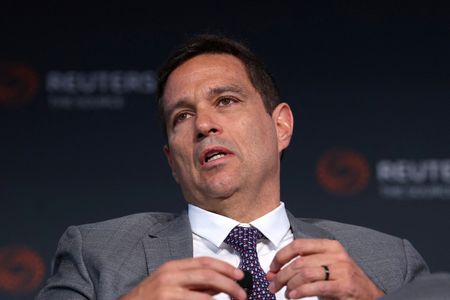By Marcela Ayres
BRASILIA (Reuters) – Brazil’s central bank chief said on Friday that the environment of greater uncertainties does not have a mechanical relationship with the conduct of monetary policy, emphasizing that U.S. interest rates are currently a major beacon.
Speaking at an event hosted by the Young President’s Organization (YPO), he said all eyes are focused on the inflation of the world’s largest economy, which has stopped falling.
The topic is highly relevant for global liquidity and the central bank is discussing the external environment more than usual “because it’s very relevant to us right now”.
If interest rates in the U.S. remain higher for longer, extra liquidity will be drawn to the developed world, which will impact both emerging markets and corporate debts, said Campos Neto, adding that this outlook probably implies a trend of a stronger U.S. dollar for a longer period.
“The increase in uncertainty doesn’t mean … that there is a mechanical relationship (with monetary policy). It means that there is a concern that we thought could happen, it is happening, and it is happening faster than we thought.”
On Monday, Campos Neto highlighted that policymakers “couldn’t provide guidance due to significant uncertainty,” indicating they were no longer committed to a future 50 basis-point cut.
The central bank revised its monetary policy guidance in March, anticipating a new 50 basis-point reduction at its next meeting in May and departing from its previous pattern of signaling same-size cuts for “upcoming meetings”.
Since the beginning of the monetary easing cycle in August, borrowing cuts have been cut by 300 basis points to 10.75%.
Campos Neto also said that it is currently very difficult for the political class in the world to embrace any kind of fiscal tightening.
“What will happen is that central banks’ lives will become more difficult with expansionary fiscal policies,” he said.
After inflation data in Brazil showed an annual advance of 3.77% to mid-April, slowing down from 4.14% in the 12 months to mid-March, Campos Neto said that the reading seemed to have improved, but he needed to examine the details.
He stressed that inflation expectations in the country have been ticking up, and that policymakers are trying to understand the reasons for that, which could include higher oil prices and a stronger U.S. dollar.
(Reporting by Marcela Ayres; Editing by Steven Grattan)





